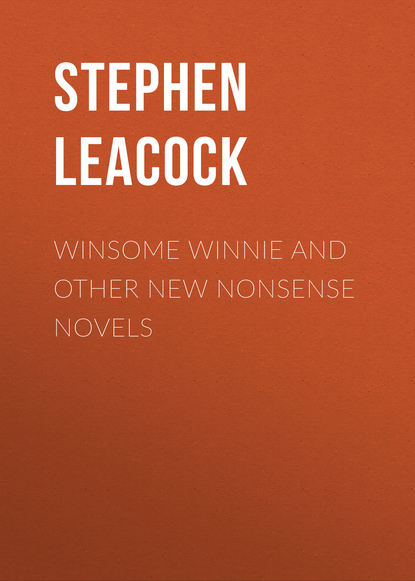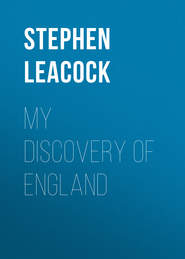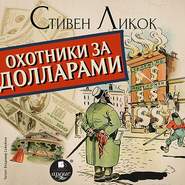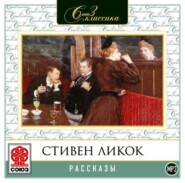По всем вопросам обращайтесь на: info@litportal.ru
(©) 2003-2024.
✖
Winsome Winnie and other New Nonsense Novels
Автор
Год написания книги
2019
Настройки чтения
Размер шрифта
Высота строк
Поля
At that moment Lady Buggam and Clara and the other girls came trooping out on the verandah, and the whole thing passed clean out of my mind. Nor did I think of it again until I was back in London. Then, by one of those strange coincidences or premonitions—call it what you will—it suddenly occurred to me one morning that it was the fifteenth of November. Whether Sir Jeremy had written to Horrod or not, I did not know. But none the less nightfall found me, as I have described, knocking at the door of Buggam Grange.
The sound of the knocker had scarcely ceased to echo when I heard the shuffling of feet within, and the sound of chains and bolts being withdrawn. The door opened. A man stood before me holding a lighted candle which he shaded with his hand. His faded black clothes, once apparently a butler's dress, his white hair and advanced age left me in no doubt that he was Horrod of whom Sir Jeremy had spoken.
Without a word he motioned me to come in, and, still without speech, he helped me to remove my wet outer garments, and then beckoned me into a great room, evidently the dining-room of the Grange.
I am not in any degree a nervous man by temperament, as I think I remarked before, and yet there was something in the vastness of the wainscoted room, lighted only by a single candle, and in the silence of the empty house, and still more in the appearance of my speechless attendant, which gave me a feeling of distinct uneasiness. As Horrod moved to and fro I took occasion to scrutinize his face more narrowly. I have seldom seen features more calculated to inspire a nervous dread. The pallor of his face and the whiteness of his hair (the man was at least seventy), and still more the peculiar furtiveness of his eyes, seemed to mark him as one who lived under a great terror. He moved with a noiseless step and at times he turned his head to glance in the dark corners of the room.
"Sir Jeremy told me," I said, speaking as loudly and as heartily as I could, "that he would apprise you of my coming."
I was looking into his face as I spoke.
In answer Horrod laid his finger across his lips and I knew that he was deaf and dumb. I am not nervous (I think I said that), but the realization that my sole companion in the empty house was a deaf mute struck a cold chill to my heart.
Horrod laid in front of me a cold meat pie, a cold goose, a cheese, and a tall flagon of cider. But my appetite was gone. I ate the goose, but found that after I had finished the pie I had but little zest for the cheese, which I finished without enjoyment. The cider had a sour taste, and after having permitted Horrod to refill the flagon twice I found that it induced a sense of melancholy and decided to drink no more.
My meal finished, the butler picked up the candle and beckoned me to follow him. We passed through the empty corridors of the house, a long line of pictured Buggams looking upon us as we passed, their portraits in the flickering light of the taper assuming a strange and life-like appearance, as if leaning forward from their frames to gaze upon the intruder.
Horrod led me upstairs and I realized that he was taking me to the tower in the east wing, in which I had observed a light.
The rooms to which the butler conducted me consisted of a sitting-room with an adjoining bedroom, both of them fitted with antique wainscoting against which a faded tapestry fluttered. There was a candle burning on the table in the sitting-room, but its insufficient light only rendered the surroundings the more dismal. Horrod bent down in front of the fireplace and endeavoured to light a fire there. But the wood was evidently damp and the fire flickered feebly on the hearth.
The butler left me, and in the stillness of the house I could hear his shuffling step echo down the corridor. It may have been fancy, but it seemed to me that his departure was the signal for a low moan that came from somewhere behind the wainscot. There was a narrow cupboard door at one side of the room, and for the moment I wondered whether the moaning came from within. I am not as a rule lacking in courage (I am sure my reader will be decent enough to believe this), yet I found myself entirely unwilling to open the cupboard door and look within. In place of doing so I seated myself in a great chair in front of the feeble fire. I must have been seated there for some time when I happened to lift my eyes to the mantel above and saw, standing upon it, a letter addressed to myself. I knew the handwriting at once to be that of Sir Jeremy Buggam.
I opened it, and spreading it out within reach of the feeble candlelight, I read as follows:
"My dear Digby,
"In our talk that you will remember, I had no time to finish telling you about the mystery of Buggam Grange. I take for granted, however, that you will go there and that Horrod will put you in the tower rooms, which are the only ones that make any pretence of being habitable. I have, therefore, sent him this letter to deliver at the Grange itself.
"The story is this:
"On the night of the fifteenth of November, fifty years ago, my grandfather was murdered in the room in which you are sitting, by his cousin, Sir Duggam Buggam. He was stabbed from behind while seated at the little table at which you are probably reading this letter. The two had been playing cards at the table and my grandfather's body was found lying in a litter of cards and gold sovereigns on the floor. Sir Duggam Buggam, insensible from drink, lay beside him, the fatal knife at his hand, his fingers smeared with blood. My grandfather, though of the younger branch, possessed a part of the estates which were to revert to Sir Duggam on his death. Sir Duggam Buggam was tried at the Assizes and was hanged. On the day of his execution he was permitted by the authorities, out of respect for his rank, to wear a mask to the scaffold. The clothes in which he was executed are hanging at full length in the little cupboard to your right, and the mask is above them. It is said that on every fifteenth of November at midnight the cupboard door opens and Sir Duggam Buggam walks out into the room. It has been found impossible to get servants to remain at the Grange, and the place—except for the presence of Horrod—has been unoccupied for a generation. At the time of the murder Horrod was a young man of twenty-two, newly entered into the service of the family. It was he who entered the room and discovered the crime. On the day of the execution he was stricken with paralysis and has never spoken since. From that time to this he has never consented to leave the Grange, where he lives in isolation.
"Wishing you a pleasant night after your tiring journey,
"I remain,
"Very faithfully,
"Jeremy Buggam."
I leave my reader to imagine my state of mind when I completed the perusal of the letter.
I have as little belief in the supernatural as anyone, yet I must confess that there was something in the surroundings in which I now found myself which rendered me at least uncomfortable. My reader may smile if he will, but I assure him that it was with a very distinct feeling of uneasiness that I at length managed to rise to my feet, and, grasping my candle in my hand, to move backward into the bedroom. As I backed into it something so like a moan seemed to proceed from the closed cupboard that I accelerated my backward movement to a considerable degree. I hastily blew out the candle, threw myself upon the bed and drew the bedclothes over my head, keeping, however, one eye and one ear still out and available.
How long I lay thus listening to every sound, I cannot tell. The stillness had become absolute. From time to time I could dimly hear the distant cry of an owl, and once far away in the building below a sound as of some one dragging a chain along a floor. More than once I was certain that I heard the sound of moaning behind the wainscot. Meantime I realized that the hour must now be drawing close upon the fatal moment of midnight. My watch I could not see in the darkness, but by reckoning the time that must have elapsed I knew that midnight could not be far away. Then presently my ear, alert to every sound, could just distinguish far away across the fens the striking of a church bell, in the clock tower of Buggam village church, no doubt, tolling the hour of twelve.
On the last stroke of twelve, the cupboard door in the next room opened. There is no need to ask me how I knew it. I couldn't, of course, see it, but I could hear, or sense in some way, the sound of it. I could feel my hair, all of it, rising upon my head. I was aware that there was a presence in the adjoining room, I will not say a person, a living soul, but a presence. Anyone who has been in the next room to a presence will know just how I felt. I could hear a sound as of some one groping on the floor and the faint rattle as of coins.
My hair was now perpendicular. My reader can blame it or not, but it was.
Then at this very moment from somewhere below in the building there came the sound of a prolonged and piercing cry, a cry as of a soul passing in agony. My reader may censure me or not, but right at this moment I decided to beat it. Whether I should have remained to see what was happening is a question that I will not discuss. My one idea was to get out, and to get out quickly. The window of the tower room was some twenty-five feet above the ground. I sprang out through the casement in one leap and landed on the grass below. I jumped over the shrubbery in one bound and cleared the moat in one jump. I went down the avenue in about six strides and ran five miles along the road through the fens in three minutes. This at least is an accurate transcription of my sensations. It may have taken longer. I never stopped till I found myself on the threshold of the Buggam Arms in Little Buggam, beating on the door for the landlord.
I returned to Buggam Grange on the next day in the bright sunlight of a frosty November morning, in a seven-cylinder motor car with six local constables and a physician. It makes all the difference. We carried revolvers, spades, pickaxes, shotguns and an ouija board.
What we found cleared up for ever the mystery of the Grange. We discovered Horrod the butler lying on the dining-room floor quite dead. The physician said that he had died from heart failure. There was evidence from the marks of his shoes in the dust that he had come in the night to the tower room. On the table he had placed a paper which contained a full confession of his having murdered Jeremy Buggam fifty years before. The circumstances of the murder had rendered it easy for him to fasten the crime upon Sir Duggam, already insensible from drink. A few minutes with the ouija board enabled us to get a full corroboration from Sir Duggam. He promised, moreover, now that his name was cleared, to go away from the premises for ever.
My friend, the present Sir Jeremy, has rehabilitated Buggam Grange. The place is rebuilt. The moat is drained. The whole house is lit with electricity. There are beautiful motor drives in all directions in the woods. He has had the bats shot and the owls stuffed. His daughter, Clara Buggam, became my wife. She is looking over my shoulder as I write. What more do you want?
THE END
BY THE SAME AUTHOR
LITERARY LAPSES
Twelfth Edition. Crown 8vo. 5s. net
Spectator.—"This little book is a happy example of the way in which the double life can be lived blamelessly and to the great advantage of the community. The book fairly entitles Mr. Leacock to be considered not only a humorist but a benefactor. The contents should appeal to English readers with the double virtue that attaches to work which is at once new and richly humorous."
Globe.—"One specimen of Mr. Leacock's humour, 'Boarding-House Geometry,' has long been treasured on this side."
The Guardian.—"Much to be welcomed is Professor Stephen Leacock's 'Literary Lapses,'—this charming and humorous work. All the sketches have a freshness and a new personal touch. Mr. Leacock is, as the politicians say, 'a national asset,' and Mr. Leacock is a Canadian to be proud of. One has the comfortable feeling as one reads that one is in the company of a cultured person capable of attractive varieties of foolishness."
Pall Mall Gazette.—"The appearance of 'Literary Lapses' is practically the English début of a young Canadian writer who is turning from medicine to literature with every success. Dr. Stephen Leacock is at least the equal of many who are likely to be long remembered for their short comic sketches and essays; he has already shown that he has the high spirits of 'Max Adeler' and the fine sense of quick fun. There are many sketches in 'Literary Lapses' that are worthy of comparison with the best American humour."
Morning Post.—"The close connection between imagination, humour, and the mathematical faculty has never been so delightfully demonstrated."
Outlook.—"Mr. John Lane must be credited with the desire of associating the Bodley Head with the discovery of new humorists. Mr. Leacock sets out to make people laugh. He succeeds and makes them laugh at the right thing. He has a wide range of new subjects; the world will gain in cheerfulness if Mr. Leacock continues to produce so many excellent jests to the book as there are in the one under notice."
Truth.—"By the publication of Mr. Stephen Leacock's 'Literary Lapses' Mr. John Lane has introduced to the British Public a new American humorist for whom a widespread popularity can be confidently predicted."
LONDON: JOHN LANE, THE BODLEY HEAD
BY THE SAME AUTHOR
NONSENSE NOVELS
THIRTEENTH EDITION
Crown 8vo. 5s. net
Spectator.—"We can assure our readers who delight in mere joyous desipience that they will find a rich harvest of laughter in the purely irresponsible outpourings of Professor Leacock's fancy."
Pall Mall Gazette.—"It is all not only healthy satire, but healthy humour as well, and shows that the author of 'Literary Lapses' is capable of producing a steady flow of high spirits put into a form which is equal to the best traditions of contemporary humour. Mr. Leacock certainly bids fair to rival the immortal 'Lewis Carroll' in combining the irreconcilable—exact science with perfect humour—and making the amusement better the instruction."
Daily Mail.—"In his 'Literary Lapses' Mr. Stephen Leacock gave the laughter-loving world assurance of a new humorist of irresistible high spirits and rare spontaneity and freshness. By this rollicking collection of 'Nonsense Novels,' in tabloid form, he not only confirms the excellent impression of his earlier work, but establishes his reputation as a master of the art of literary burlesque. The whole collection is a sheer delight, and places its author in the front rank as a literary humorist."
Mr. James Douglas in The Star.—"We have all laughed over Mr. Stephen Leacock's 'Literary Lapses.' It is one of those books one would die rather than lend, for to lend it is to lose it for ever. Mr. Leacock's new book, 'Nonsense Novels,' is more humorous than 'Literary Lapses.' That is to say, it is the most humorous book we have had since Mr. Dooley swum into our ken. Its humour is so rich that it places Mr. Leacock beside Mark Twain."














